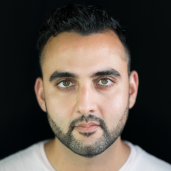- HOME
- STORIES
- Graduate Programs
- word cafe
- MFA Fiction Alumnus Ankur Thakkar on the Synergy Between His Visual and Written Work
MFA Fiction Alumnus Ankur Thakkar on the Synergy Between His Visual and Written Work

A literature class that has stayed with me since I finished my MFA degree in fiction at Northwestern explored the impact of 20th century technologies on the novel. We read critical texts on the advent of train travel and mass urbanization paired with novels from that era in order to think about how technology changed how time was depicted on the page, the representation of the distances characters could now travel, the things they could notice that they couldn’t see before. I traveled by train to the evening class from my job leading digital efforts for the city, helping Chicago’s 21st century flaneurs get their CTA updates on Twitter, borrow public bicycles to traverse newly-constructed bike lanes, and watch the city’s fleet of snow plows work, all on their phones.
Working on technology professionally pushed my artistic work. I launched a storytelling project with the Chicago Public Library to write a collaborative story online with far more talented writers, which included Roxane Gay and Patrick Somerville. I converted the opening scene of my graduate thesis into a swipeable story, launched a newsletter with my ex-girlfriend to explore our relationship’s demise, and curated thousands of poorly-subtitled Bollywood screenshots from different films to tell one story.
Technology enabled me to reinterpret traditional art forms, but I also used art to interrogate the technology. One essay focused on the promise and reality of meeting someone on a dating app, another short story told the history of a brand image moving backwards in time, and I exhibited a video piece in which I juxtaposed the tags assigned to stock videos of people of color with the language used to represent black and brown bodies in Ferguson, Missouri’s wake. I was trying to understand how our histories will be interpreted by a machine in the future, a question that wasn’t about generative AI when it was initially asked, though it certainly feels like one now.
What I’m trying to say is that the internet is equally inspiring and terrifying to me. We’ve all been living through a deep upending of culture by the growth of algorithmic entertainment. That isn’t news, but how to represent this upheaval on the page? What about the digital shadowlands that necessarily emerge with the rise of influencer culture? How do we navigate the melding of public and private selves, fame and faith, loneliness and connection? I’m working on a novel to try and answer these questions. And while I definitely won’t be alive when a course titled “21st Century Technologies and the Novel” is taught at Northwestern, I hope to contribute my voice to all of the incredible work that explores how we live because and in spite of the time we live in.
